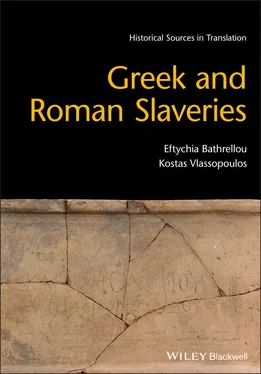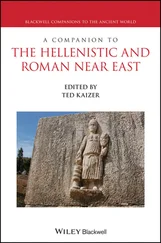Farewell.
What kind of inscription is this?
What kind of community is presented here honoring Amerimnos? What forms of kinship are evident? Cf. 7.12.
Are these people slaves? How can we know?
Is the master of these people mentioned? If not, what are the implications?
What do you think about the use of the vocabulary of honor by this group of slaves?
1.17 CIL VI, 6308 (Latin Text After Caldelli and Ricci 1999): Latin Funerary Inscription, Rome (First Half of First Century CE)
The deceased was buried in the columbarium of the slaves and freedpersons of the aristocratic Statilii Tauri (see 4.9, 10.16). For columbaria, see 7.17.
Literature: Caldelli and Ricci 1999; Borbonus 2014.
Jucundus, [freedman?] of Taurus, litter-bearer. So long as he was alive, he was a man, and defended both himself and others. So long as he was alive, he lived honorably.
This is offered by Callista and Philologus.
What was Jucundus’ legal and work status?
How is he described in his epitaph?
What was the role of honor in Jucundus’ life?
1.18 P.Turner 41, 1–20: Papyrus with Petition in Greek, Oxyrhynchos, Egypt (Mid-Third Century CE)
Literature: Llewelyn 1992: 55–60, 1997: 9–46.
Aurelia Sarapias, also called Dionysarion, daughter of Apollophanes, also called Sarapammon, formerly exegêtês of Antinoopolis, acting without a guardian, in accordance with the ius liberorum . 19I own a slave, formerly my father’s, Sarapion by name, who I thought would commit no wrongdoing because he was part of my patrimony and had been entrusted by me with our affairs. This man, I don’t know how, at the instigation of others, adopted an enemy’s attitude toward the honor and the provision of the necessities for life I was giving him. He stealthily took from our household some clothes I had prepared for him and some other stuff, which he helped himself to from our belongings, and secretly ran away. When it came to my ears that he was at Chairemon’s, in the hamlet of Nomou, I requested […].
What are the names of the mistress and the slave? Can we draw any conclusions from this?
How is Sarapion described?
Why did Sarapias not expect him to betray her and flee?
Why does Sarapias think that Sarapion was ungrateful? What did she offer her slave?
What do you think of the employment of the term honor in this context?
How does Sarapias explain Sarapion’s change of behavior? How credible do you find her explanation? What other explanations can you think of?
What can we learn about “the mind of the master class” from this petition?
SLAVERY AS AN ASYMMETRICAL NEGOTIATION
1.19 Herodas, Mimiambs , 5: 20Greek Verse Mime (First Half of Third Century BCE)
Herodas’ mimiambs are poems of a dramatic form, written in a type of iambic meter associated with invective poetry. They are influenced by comedy and the mime and were probably not only read but also performed, possibly to a fairly learned audience. For many societies, the theme of sexual relations between a mistress and her slave is an object of satire.
Literature: Fountoulakis 2007; Parker 2007; Todd 2013.
Bitinna:Tell me, Gastron. Is this so overfull, that it is no longer enough for you to move my legs, but you’ve been coming on to Menon’s Amphytaia?
Gastron: I to Amphytaia? Have I seen the woman you speak of?
Bitinna: You spin out excuses all day long.
Gastron: Bitinna, I’m a slave. Do whatever you want with me but don’t suck my blood day and night.
Bitinna: You! You can’t hold your tongue either! – Kydilla, where is Pyrrhias? Call him to me.
Pyrrhias: What is it?
Bitinna: Bind this man! Are you still standing there? Untie first the rope from the bucket. Fast! – If I don’t make an example of you to the whole country with my beatings, don’t count me a woman. – Isn’t he, rather, like the proverbial Phrygian, who is the better for a beating? – I am the one responsible for this, Gastron, I, who set you up among men. But if I erred back then, you won’t find Bitinna a fool now, as you think – not anymore. – Come, you, by yourself! Take his cloak off and bind him.
Gastron: No, no, Bitinna, I beseech you as your suppliant.
Bitinna: Take it off, I say. You must realize that you are a slave and that I put down three minae for you. I wish the day that brought you here had never dawned. – Pyrrhias, you’ll be sorry. I see you doing everything but binding him. Tie his elbows together tightly; saw them off with the rope.
Gastron: Bitinna, let me off this error. I’m human. I erred. But if you catch me again doing something not to your liking, have me tattooed.
Bitinna: Don’t try to make up to me like this. Do it to Amphytaia, with whom you roll about and […]. 21
Pyrrhias: I’ve bound him fast for you.
Bitinna: See to it that he doesn’t untie himself without your noticing. Take him to the executioner’s, to Hermon, and tell him to strike a thousand blows into his back and a thousand to his belly.
Gastron: Will you have me killed, Bitinna, without first examining whether this is true or false?
Bitinna: When you yourself just said, with your own tongue, “Bitinna, let me off this error?”
Gastron: I wanted to cool off your anger.
Bitinna: You, are you still standing staring? Aren’t you taking him where I’m telling you to? – Kydilla, crush the snout of this rogue. – And you, Drechon, do me the favor and follow wherever this man here might lead you. – Slave girl, give a rug to this cursed fellow, to cover his unmentionable … tail, so that he won’t become a spectacle walking naked through the market-place. – For the second time, Pyrrhias, I’m telling you once more: you are to tell Hermon to inflict a thousand here and a thousand there. Have you heard? If you stray from what I say by one iota, you yourself will pay both the principal and the interest. Go on now. And don’t take him by Mikkale’s but by the direct road. – Just as well I remembered: Slave girl, call them, run and call them, before they get far.
Kydilla: Pyrrhias! You wretch! You deaf one! She’s calling you. Ah! But you look as if it is a grave-robber you pull to pieces – not your fellow-slave. Look how violently you are now dragging him to be tortured! Ah, Pyrrhias! It is you whom Kydilla will see, with these very two eyes, in five days, at Antidoros’, rubbing your ankles with those Achaean chains that you recently shed.
Bitinna: Hey, you. Come back here, keeping this man bound exactly as when you were taking him away. Call me Kosis the tatooer and ask him to come here, bringing needles and ink. – In one go, you must turn … colorful. – Gag him and hang him, like the … honorable Daos!
Kydilla: No, mummy. Let him off now. I beg you. As your Batyllis may live, and you may see her entering her husband’s house and take her children in your arms. This one error….
Bitinna: Kydilla, don’t give me grief, or I will run out of the house. Shall I let him off? This seventh-generation slave? And which woman won’t justly spit on my face when she sees me? No, by the Lady Tyrant, our goddess! But since he, although human, does not know himself, he will now find out, with this inscription on his forehead.
Kydilla: But it is the twentieth, and the Gerenia festival is in four days.
Читать дальше












